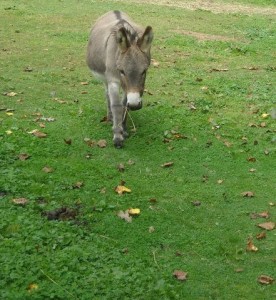 When I wrote about the talking donkey in the Bible, that started me down a rabbit trail of other donkeys who made their way into the inspired Word of God. Two more quickly came to my mind.
When I wrote about the talking donkey in the Bible, that started me down a rabbit trail of other donkeys who made their way into the inspired Word of God. Two more quickly came to my mind.
If you’re like me, your first thought would be the donkey in the nativity story. Naturally, the Christmas donkey has to be the preeminent one in the Bible, right? That donkey carried Mary, mere hours away from giving birth to our Saviour Immanuel, as she and Joseph entered Bethlehem.
I searched the gospel accounts to read more, and I couldn’t find any donkey. None. In fact, there’s not any mention of how Mary and Joseph reached Bethlehem. Matthew glosses over the finer points to get to the bottom line: she gave birth to a son. Mark and John don’t mention the trip at all. Luke goes into the most detail but not about how they got to Bethlehem. It’s likely they did travel by donkey, but that’s more a cultural guess than absolute truth.
So, on to my second donkey. This one, the Easter donkey, is actually mentioned by all four of the gospel writers. Further proof that Easter, with whole chapters devoted to it in each gospel account, is more central than Christmas. It’s the crux (the cross), the centerpiece on which our whole faith hangs.
This Easter donkey had the honor of carrying Jesus on Palm Sunday. He, too, heard the thunderous praise of the people, and probably swelled with pride. This Sunday, we commemorate that triumphal entry into Jerusalem.
As they approached Jerusalem and came to Bethphage on the Mount of Olives, Jesus sent two disciples, saying to them, “Go to the village ahead of you, and at once you will find a donkey tied there, with her colt by her. Untie them and bring them to me. If anyone says anything to you, say that the Lord needs them, and he will send them right away.” (Matthew 21:1-2)
Of course, the disciples find the donkey and her colt exactly as Jesus states. It was also exactly as the prophet Zechariah stated about 500 years earlier.
“Rejoice greatly, Daughter Zion! Shout, Daughter Jerusalem! See, your king comes to you, righteous and victorious, lowly and riding on a donkey, on a colt, the foal of a donkey.”
The disciples throw their cloaks — not on the full-grown donkey but on her young colt — for Jesus to ride. Luke goes a step further by telling us that “no one yet has ever sat” on this colt. Imagine, his first passenger was the Messiah! A huge crowd gathers, strews their cloaks and palm branches all over the road, and shouts, “Hosanna! Blessed is he who comes in the name of the Lord!”
The throng could never have anticipated how quickly that feeling of triumphant euphoria would vanish. That tiny foretaste of glory divine was soon to be supplanted with the deepest sadness the world has ever known.
The people hoped for a King to usher in victory over their political enemies, a King who would prance in on a magnificent steed. Instead, they got a humble servant. Riding on a lowly young donkey.
Isn’t that just like God? He delights to remake broken pottery. He places unlikely women — a prostitute, a foreigner, and an adulterer — in Jesus’s genealogy. He whittles down Gideon’s army to just 300 men, so they won’t boast, and empowers them to defeat a vast army.
He confounds us by using the lowly to fulfill His lofty plans.
He chooses a common donkey to carry the most precious passenger ever.